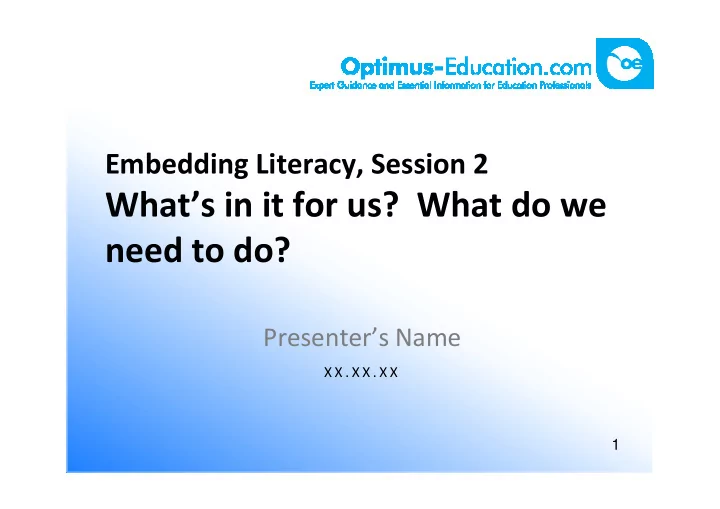

Embedding Literacy, Session 2 What’s in it for us? What do we need to do? need to do? Presenter’s Name X X . X X . X X 1
Aims and outcomes Aims Appreciate the rationale for promoting literacy across the • curriculum. Outcomes Make a commitment to take positive practical action to • promote literacy across the curriculum. Become members of the school’s literacy learning community. • Go away equipped with practical literacy strategies that you can • experiment with in your classroom and gain success. 2
Achieving 5 A*-C grades at GCSE including English and mathematics: Pupils not eligible for FSM Pupils eligible for FSM Overall 62.0% Overall 34.6 % Boys 58.3%; Girls 65.8% Boys 31.4%; Girls 37.9% White British 61.8% White British 61.8% White British 28.8% White British 28.8% Boys 58.5%; Girls 65.6% Boys 26.0%; Girls 31.7% • • Mixed Race (all) 63.2% Mixed Race (all) 39.5% Black Caribbean 52.0% Black Caribbean 37.8% Looked-after children 15% 3
National concerns about literacy ‘This year’s annual skills survey from the CBI found that more than two-fifths of firms are not satisfied with the basic literacy of school and college leavers.’ DfE press notice, May 2012 DfE press notice, May 2012 ‘..secondary school teachers identified 57% of their pupils as having weak or very weak literacy skills..’ Report on the inquiry into overcoming 4 the barriers to literacy, 2011
Ofsted, March 2012 ‘ The expectation in the revised Teachers’ Standards is that all teachers will promote literacy and use Standard English.’ English.’ 5
Language is for learning • Literacy needs to be taught – it’s not just caught • Every teacher in English is a teacher of English • Every teacher in English is a teacher of English 6
Literacy supports learning in your subject Pupils need vocabulary, expression and organisational control • to cope with the cognitive demands of subjects. Reading enables us to learn from sources beyond our • immediate experience. Through language we make and revise meaning. Through language we make and revise meaning. • Writing helps us to sustain and order thought. • Responding to higher order questions encourages the • development of thinking skills and enquiry. Better literacy leads to improved self-esteem, motivation and • behaviour. 7 It allows pupils to learn independently. •
Quick wins 1 Create an accessible language-friendly environment in classrooms: Use either ����������� or �������� font for all home • produced materials, and white board displays - they’re produced materials, and white board displays - they’re dyslexia friendly Don't justify writing – it makes some word shapes unfamiliar • Don’t use ALL CAPITALS or underlining – use bold for • emphasis (the others are difficult to read) Use buff colour as background for electronic whiteboards, or • unbleached paper for worksheets – less glare. 8
Quick wins 2 The reading buzz ‘Finding ways to engage Extend reading in your students in reading may be subject: one of the most effective • Post relevant articles, ways to leverage social news items etc. closely news items etc. closely change.’ linked to current learning, on the school PISA International Report , VLE for pupils to read for homework. Ofsted, 2002 9
Quick wins 3 Spelling and vocabulary Explicitly teach the key vocabulary of your subject. Display key vocabulary in the classroom within useful sentences • for reference. In teams play ‘match the term to the explanation’. • Introduce easy spelling techniques, for example highlight the • most challenging part of a word to spell, for example parliament to trigger visual memory. Ask pupils to find words within a word, for example parliament • – I am. Ask pupils to find words in the same family (muscle – muscular). • Trigger visual and oral memory: Look cover say write check. 10 •
Quick wins 4 Spoken Standard English Support pupils to use Standard English when speaking in class Model spoken Standard English to pupils at all times. Ask pupils to use the language you use when giving answers, making comments etc. Ask pupils how they could say that in a more formal, academic way by suggesting they ‘speak like an expert’. Explain that it’s oral rehearsal for writing. If they say it, they can write it. 11
Quick wins 5 Literacy objectives ‘ where staff had included For each lesson include a an objective for literacy in literacy objective all the lessons, senior alongside your subject managers noted an learning objective. improvement in outcomes improvement in outcomes For example, For example, across all subjects’ across all subjects’ Speak like an expert when • Removing barriers to reporting back in class, or in literacy , Ofsted, 2011 pair and group discussion. Use the correct subject • terminology when speaking and/or writing 12
Recommend
More recommend